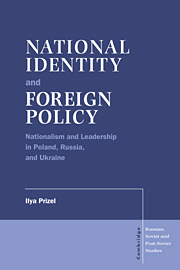Book contents
- Frontmatter
- Contents
- Preface
- Introduction: statement of arguments
- 1 National identity and foreign policy: a dialectical relationship
- 2 Polish identity 1795–1944: from romanticism to positivism to ethnonationalism
- 3 Poland after World War II: native conservatism and the return to Central Europe
- 4 Polish foreign policy in perspective: a new encounter with positivism
- 5 Russia's national identity and the accursed question: a strong state and a weak society
- 6 Russian identity and the Soviet period
- 7 Russia's foreign policy reconsidered
- 8 Ukraine: the ambivalent identity of a submerged nation, 1654–1945
- 9 Ukraine after World War II: birth pangs of a modern identity
- 10 Foreign policy as a means of nation building
- 11 Conclusion: national identity and politics in the age of the “Mass-Man”
- Index
- Cambridge Russian, Soviet and Post-Soviet Studies
7 - Russia's foreign policy reconsidered
Published online by Cambridge University Press: 18 December 2009
- Frontmatter
- Contents
- Preface
- Introduction: statement of arguments
- 1 National identity and foreign policy: a dialectical relationship
- 2 Polish identity 1795–1944: from romanticism to positivism to ethnonationalism
- 3 Poland after World War II: native conservatism and the return to Central Europe
- 4 Polish foreign policy in perspective: a new encounter with positivism
- 5 Russia's national identity and the accursed question: a strong state and a weak society
- 6 Russian identity and the Soviet period
- 7 Russia's foreign policy reconsidered
- 8 Ukraine: the ambivalent identity of a submerged nation, 1654–1945
- 9 Ukraine after World War II: birth pangs of a modern identity
- 10 Foreign policy as a means of nation building
- 11 Conclusion: national identity and politics in the age of the “Mass-Man”
- Index
- Cambridge Russian, Soviet and Post-Soviet Studies
Summary
Having lived gloriously for a long time [nations] are unable to break with their past, whatever they do. They experience its influence at the very time they work to destroy it. In the midst of their outstanding transformations, they remain in the essential aspects of their character and destiny the product of their history. Even the most daring and powerful revolution cannot abolish national traditions that have existed for a long time.
François Guizot, Essai sur l'histoire de France (1824)As a result of imperialist and civil wars, Russian temporarily disappeared from the horizon as a Great Power. Russia is coming back to the international stage. Let us hope that the day is at hand when her reappearance will be felt so strongly, that no one will dare to contradict her voice.
Izvestia, 7 December 1922Do not think of Russia as a dead tiger. It is a great state that will demonstrate its might. It is necessary to be attentive in the conduct of relationships with Russia: It is never simple diplomacy – it is never a simple country.
Deng XiaopingIf both its geopolitical position and the inherent set of values underlying its notion of the “national interest” shape a state's foreign policy, then currently no other foreign policy is subject to greater pressure and disorientation than that of post-communist Russia. Within the short space of three years the Russian people have seen the ideology that dominated their polity for seven decades de-legitimized. Worse still, they have lost the vast territories that for centuries they considered their own and have witnessed the disappearance of an imperial status that has been part and parcel to Russia's national being since at least the sixteenth century.
- Type
- Chapter
- Information
- National Identity and Foreign PolicyNationalism and Leadership in Poland, Russia and Ukraine, pp. 239 - 299Publisher: Cambridge University PressPrint publication year: 1998



